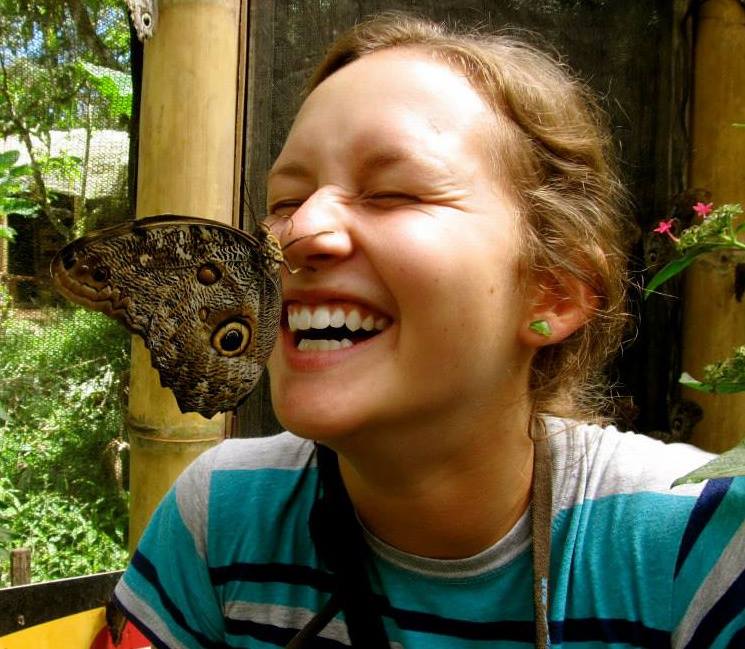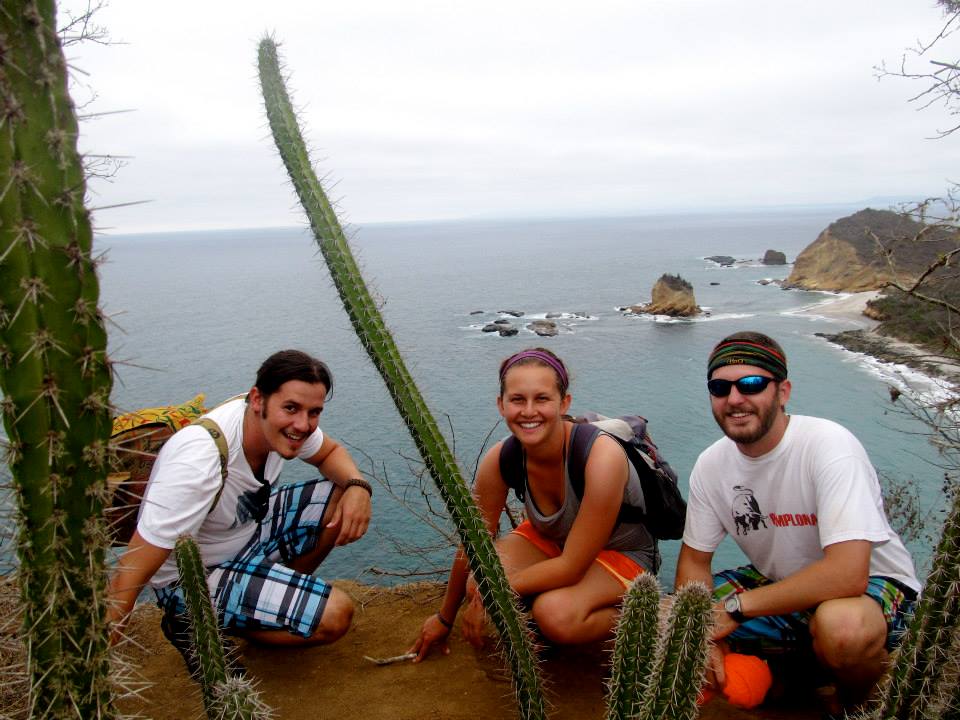
Teaching Abroad in Ecuador
Kat from Girls Gone Working has done some incredibly things across our globe. She has taught abroad with the Peace Corps in Ecuador, helped a school in the Amazon develop curriculum on a whim, taught at a private school in Korea, and taught in Ho Chi Minh. Now she is exclusively teaching online and working on growing her website. Check out Kat’s story about her time in Ecuador with the Peace Corps below!

What made you want to teach abroad?
Rewind a few years back to 2012. I was getting ready to graduate university. My bags were packed and I had a one-way ticket to Ecuador booked exactly a month after my graduation ceremony. See, I took a semester off between high school and university and went off on a 3-month solo adventure to Guatemala. I went back home, mainly due to pressure from my parents and finished up university. But since the day I left Guatemala, I had one clear goal- to move abroad, indefinitely.
I never really planned to teach English abroad. In college, I studied International Affairs with a focus on Latin America and the Caribbean. I wanted to work at an NGO or even the State Department. But first and foremost, my eyes were set on the Peace Corps.
Peace Corps
The application is a bit more straight forward now. But 8 years ago, when I first applied, it was a long process and all the decisions about where you’d go and what job you’d do were up to them, not me. For me, that was perfect. I was open minded and eager to experience just about anything.
After I applied, the Peace Corps suggested I go ahead and get my TEFL and try to get any additional teaching experience possible. For years I had worked as a tutor with ESL students at an elementary school, so it made sense.
Long story short, I was placed in Ecuador as a TEFL teacher. With the Peace Corps, you’re committing to 2 years of service along with 3 months of training. It’s a big commitment but for me, the time flew by.
If you’re interested in teaching abroad but don’t quite mind where you go, I’d highly consider the Peace Corps. Now, you can search their website for jobs and apply directly to teaching positions instead of sitting back and letting them do all the deciding as I did. The worst, or maybe best, part of the Peace Corps is you’ll typically be sent to rural areas or places that the typical tourist or expat would consider. To me, that was the best part about it but I know others would prefer to have their choice of glamorous city.

What was your teaching experience like?
My teaching experience, and really experience in general, was a-typical of most teachers abroad. The Peace Corps does some in-country training about the local language, culture and in my case, what the teaching environment is like.
After training is complete, the Peace Corps staff decides which location in the country you’ll be sent to. For a school to receive a volunteer, they had to apply and go through a similar application process. The Peace Corps then matches the volunteers with schools that they feel are a good fit. I really wanted to live somewhere off the grid so I was sent to a hot, dusty banana field town, Arenillas, near the border of Peru. While it’s technically a coastal town, there’s no beach in sight. Just the hot equatorial sun blazing most days.
The school also arranges a host family to live with. Each Peace Corps country has its own rules regarding how long you need to live with your host family. But in Ecuador it was 6 months.
In Ecuador, the government was pushing all English teachers to pass the TOEFL test to continue as teachers. It was a stressful time for everyone. First, that test is really hard. And second, the government announced the teachers would only get one year to pass it otherwise they’d be jobless. They quickly realized though that if they followed that though, only about 5% of English teachers would be able to keep their jobs so they continued to stretch the deadline.
My Job
The goal of my job was to teach the teachers in English. I would help them in their high school classrooms and after school hold training. For those of you that have ever spent a considerable amount of time in Latin America, I’m sure you know la hora latina or Latin hour. Meaning everything starts late if it starts at all.
The teachers at my school were wonderful. They were quick to make me feel like part of the family, but also quick to tell me they weren’t too worried about the test. They knew there wasn’t much job competition in this small town and felt pretty secure in keeping things as they were. Every once in a while a few of them would show up to the trainings. But more likely than not, we’d just enjoy a hot coffee under the hot sun laughing and speaking Spanglish. I loved these teachers but felt most of my time was being wasted, especially since they were so upfront with their opinions of wanting to do well on the test.
A Change
After almost a year, they gave me their blessing to start working at a local elementary school instead. I’ve always enjoyed working with kids more and was happy for the change.
At the elementary school, things were again a-typical. They had one very overworked English teacher would would rotate through the 10 classrooms throughout the week. Most classrooms had around 40 students, from ages 4-10. It was hectic, to say the least! In Ecuador, the curriculum is very much book-based. So she was under a lot of pressure to get through a certain number of pages each day, whether the kids understood the previous content or not. There wasn’t any time for review.
In conjuncture with helping her in the classroom, I started an afterschool program for those that wanted to learn more English or just have something different to do. Most days we stayed after playing games to supplement their lessons in the classroom and getting them moving and having fun with English. On days we didn’t have the club, we’d play soccer on the local field or do art projects. The goal of this turned into a language exchange. The kids taught me more Spanish than I probably taught them in English. And it gave us all something fun to do in the otherwise semi-sleepy town.

What was your salary and cost of living like?
With the Peace Corps, they pay for your flight, health care, and give you a monthly stipend. (Keep in mind, you’re considered a volunteer.) You also get a “readjustment allowance” at the end of your service to help you settle back into the States or somewhere new. Your monthly pay will depend on what country you live in and where in the country you are.
Since I was in a small town, I made the lowest salary, clocking in around $300 USD per month. My rent, once I moved out of my house families house to their upstairs apartment was $90 USD per month. This got me a 2-bedroom place with a kitchen, living room, and balcony. It was pretty much bare, but still a nice getaway when needed. At this time, there were only 2 places in the entire town with A/C and most homes didn’t have WiFi. It was basic, but home.
A typical lunch cost $2 and came with soup, meat, rice, veggies, a juice, and sometimes a dessert. It was enough food to count usually as 2 meals. Shopping at the market was even cheaper and beer was $1. Needless to say, even though I didn’t make much at all, I was able to save enough each month to take a vacation and visit somewhere new in Ecuador.
Too Good To Leave
I absolutely loved my time in Ecuador. So much that I even stayed a few months longer to finish up some projects and because the looming goodbye was eating at my heart. I was in a lucky situation. There was one other volunteer in town who ended up becoming like a sister to me, which is lucky because she was the only person in Arenillas who could fluently speak English. I saw one other tourist there the entire 2 years and they were lost, trying to get to Peru.
While at times it could feel frustrating to never be able to fully express yourself or understand 100% of conversations, this forced us to integrate. We didn’t have an expat bubble to hide in as you do in other places. Our level of Spanish skyrocketed, and we made real relationships. I played on the local women’s soccer league every weekend. And I went to baptisms, birthday parties, and random karaoke Wednesdays. We’d watch telenovelas in the afternoons with old women and shared meals with random families on dirt floors.
What were some positives and challenges of your job?
While I might be romanticizing Arenillas and the experience as a whole, it really was incredible.
Of course, it came with challenges though. My original group of teachers not wanting to attend trainings or improve their English was tough. I took it personally in the beginning and struggled with the feeling that I wasn’t wanted or needed. Some days, walking in the 100 degree weather felt like I lived in an oven. The only refuge to strip down in my apartment and lay on the tile floor as my one, small fan blasted semi-cool area on me. It was easy to feel awkward at social events. Especially in the beginning when I wasn’t as confident in my ability, or inability to speak Spanish. Jokes would soar way over my head and I’d have trouble saying anything that wasn’t basic sentences in the present tense.
I think those challenges are the reason the experience in whole was such a positive one though. They forced me to grow and confront views I had ingrained in my head and realistically, I walked away learning far more than I could have ever taught.
What are you doing now?
I no longer live in Ecuador but now call Da Nang, Vietnam home. After the Peace Corps, I hopped on a boat and hitchhiked through the Amazon with a friend, staying put a few months in a small village deep in the Peruvian jungle. From there, I finally went back to the States but only for a quick visit before moving to Panama. I worked in a hotel in the Bocas del Toro before getting a job as a tour guide through the San Blas Islands.
After almost 9 months of life in Panama, I was itching for a change. I headed to Europe and got a job on a superyacht in the south of France. From there, I met back up with my Colombian fling from Panama and we moved to South Korea together. I taught at a private preschool for a year before moving to Ho Chi Minh City. An ankle injury ultimately led me to quit teaching in-person and teach online as I recovered. In that time though, I started Girls Gone Working and what was a low point for me has become a blessing in disguise.
Although I don’t plan on teaching English anymore, although I never say never, I’m now “teaching” women around the world what it takes to pick up and move abroad. If I can do it, anyone can!
Related Articles: Teaching Abroad in Grand Cayman, Teaching Abroad in South Korea, Why You Should Teach Abroad

Be sure to check out Kat’s adventures and future Girls Gone Working endeavors by visiting their website.

